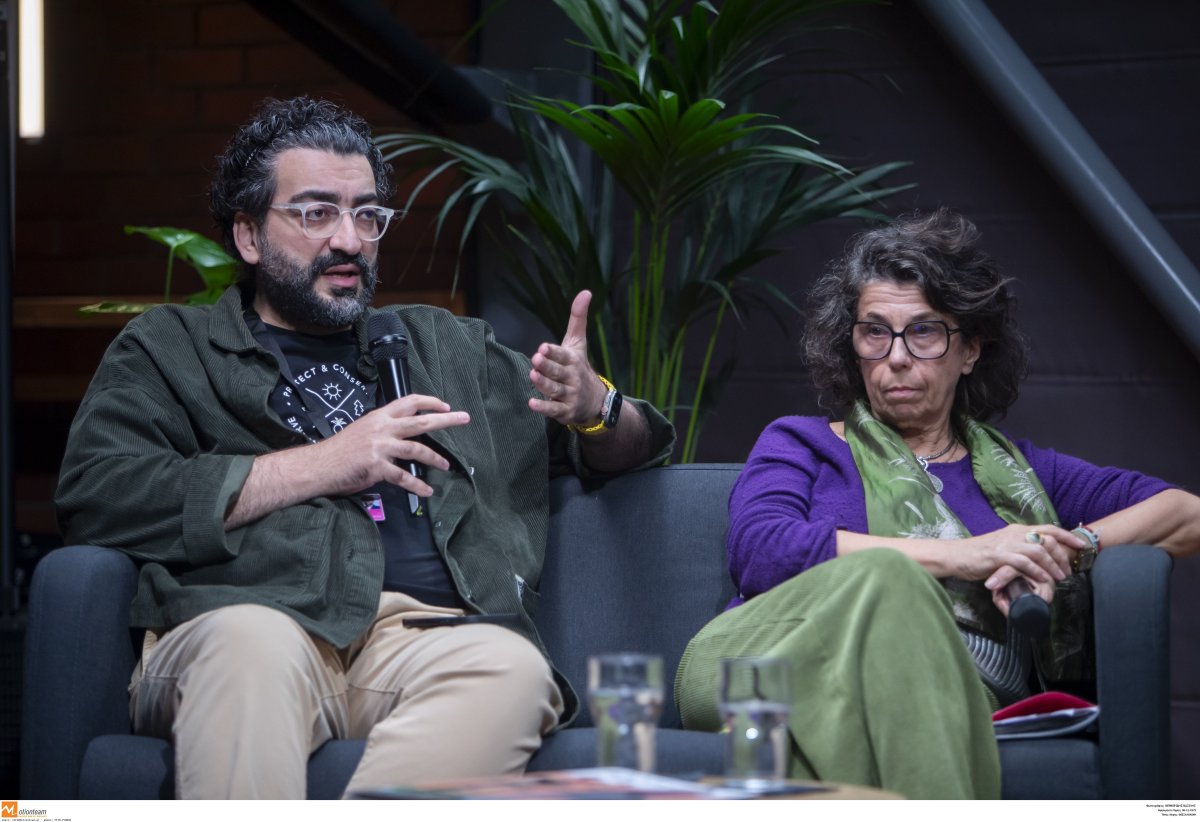As a part of the Agora Talks of the 64th Thessaloniki International Film Festival, the "Climate Storytelling" discussion took place at MOMus-Museum of Photography, focusing on how the environmental elements incorporated in our narratives affect audience perception and contribute to the creation of a wider dialogue. At the same time, the deeper social significance of integrating the climate crisis awareness into scriptwriting, looking into the role of cinema in cinematic awareness, was studied closely.
Angeliki Vergou, Ηead of the Agora welcomed the audience to the penultimate discussion of the Agora: "We would like to thank the Museum of Photography for hosting us. This is a very important conversation among three excellent professionals. We, as a Festival, actively strive to move towards sustainability, making research and taking steps towards an environment - friendly future. We are trying to motivate professionals to follow sustainable practices in film production. Generally speaking, we are trying to change the way we treat nature also through filmmaking, because stories definitely shape our lives." She then introduced the speakers.
Speakers of the event were Bassam Alasad (Producer, Creative Media Solutions, Greener Screen (JO) and Isabelle Fauvel Development advisor, CEO of Initiative Film (FR) while Emma Doxiadi Filmmaker and Sustainability Coordinator, Everybodies (GR) moderated the discussion.
Emma Doxiadi welcomed the audience as well as the speakers and gave the floor to Isabelle Fauvel: "I am not an expert in the field of green growth but I am doing my best to deal with the problem. I am a producers and directors consultant from all over the world and in our company we are looking for ways to be more aware of what we can do towards a sustainable future". She added that the green message that each script tries to convey is sometimes lost in translation and is not properly conveyed to the production manager and consequently on the screen.
Bassam Alasad then continued by saying: "We launched this initiative in 2017 and we are helping filmmakers follow and adapt to the best green production practices. On the other hand, we want to get more involved in creative storytelling; we are also filmmakers ourselves fighting for a more environment - friendly production." He added that he likes to call movies with green content Cli-Fi (alluding to Sci-Fi): "It's about integrating environmental issues into existing content. In entertainment, an industry with enormous influence on audiences, viewers become more receptive to messages. Our concern is to put these messages in the right place," he pointed out.
Then, Emma Doxiadi said that the common ground of all three is their struggle to find ways to talk about serious social issues. She referred to a survey by the Good Energy Playbook carried out in 2020, studying 37,452 films (shot in 2016-2020) and found that only 2.8% of them are references in any way to the climate crisis. "We used to have four distinct seasons and now there's a summer feel in November, the fire season seems to be growing in intensity and duration. Storytelling in films has the power to put issues at the forefront and, due to the circumstances, the demand for green content is also growing," she commented.
Bassam Alasad then referred to a survey of subtitles on British channels from 2020-2021, aiming at finding out how often the climate crisis was mentioned in non-news content and especially entertainment content (compared to words such as "cat" or "cake"). There seemed to be a huge gap, but last year things improved in a certain way: "The authors have recently started to focus more on climate issues. As someone who supports the environment, I am glad that supporting it is the trend of the time and I can't wait for it to become the norm," he commented. He then referred to the workshops they provide as a team and try to familiarise professionals with a greener era: "We try to focus on the steps we can take. I do not know whether we can provide solutions, but we try not to give conflicting messages. People can reproduce what they see on screen (best practices in food, transportation, and clothing)," he said.
"As consultants speaking we can only set off the debate," Isabelle Fauvel added: "We cannot be intrusive and try to distort the final product. I believe that the real power lies in television script writers, who literally enter the homes of thousands of people. I feel like this conversation should involve people who are making television. Its content is produced faster than that of cinema," she said. She also referred to the "list" that directors have to follow nowadays, with all these rules of political correctness that end up making their job harder.
At this point, Emma Doxiadi referred to the feeling of powerlessness many people feel before the big problem of climate change and asked the speakers if there are specific narrative tools to convey the green message. "The tools are the same as the tools used in joint production, just with the environment message incorporated in," Bassam Alasad replied. Emma Doxiadi commented that subconscious influence is the way, with small details changing in the script and "winking" at the viewer.
Isabelle Fauvel added "We keep getting dystopian scripts". We live in complicated times and it is difficult to think of utopias. But we have to believe the best is yet to come. It is extremely difficult to move forward otherwise. I'm not saying to be naïve, but to give the world hope after the disaster," she highlighted. At this point, Bassam Alasad cited comedy as the best genre for conveying green messages, because the viewer laughs and is more receptive to messages: "As Kermit the Frog said, it's hard to be green," he concluded.















